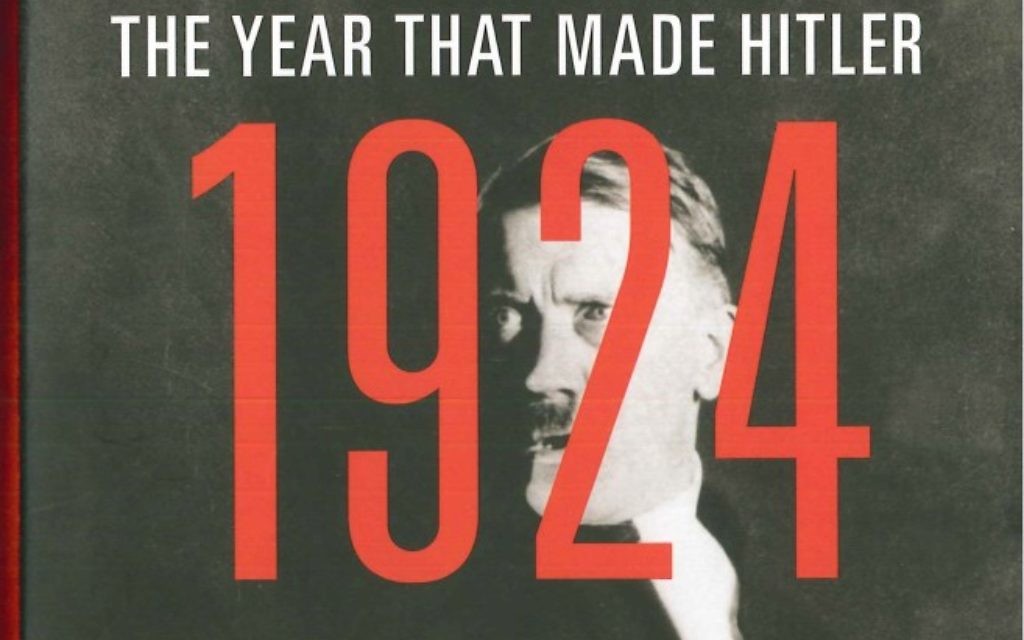Exposing Hitler’s Big Year
The closer Donald Trump has gotten to the Republican presidential nomination, the more comparisons have been made between the billionaire businessman and Adolf Hitler.
From the violence at his rallies to racist and anti-Semitic comments by some of his supporters to those right-arms-raised pledges of personal allegiance, Trump’s critics haven’t been shy about calling him a fascist and likening him to the ultimate evil.
One of the people best qualified to address such comparisons is coming to Atlanta to speak at the Carter Presidential Museum Theater on Wednesday, March 30: Athens native Peter Ross Range, who will be discussing his new book, “1924: The Year That Made Hitler.”
Get The AJT Newsletter by email and never miss our top stories Free Sign Up
From 1919 to 1923, Hitler was a “wild and crazy revolutionary” who saw no other path to power in Germany, Range said. But his Munich putsch in 1923 was a failure, killing 15 of his men and landing him in jail on treason charges.
“He had time to reflect on the error of his ways in prison,” Range said. “It was his 40-days-in-the-wilderness experience,” leading to the realization that his only hope was to gain power legally.
Range, who studied in Germany while a University of North Carolina student and spent the first four years of his journalism career there as a reporter for Time magazine in the early 1970s, found a gap in the English-language scholarship on Hitler regarding 1924. It’s known as the year he was tried for treason, went to prison and wrote “Mein Kampf,” and that’s about all you get.
By digging into German archival sources, including the transcripts of Hitler’s five-week treason trial, national and international newspaper coverage of the trial, and the published and unpublished letters of Rudolf Hess, Range said he had an intellectual adventure that led to plenty of surprises. Among them:
- The putsch was a close-run thing, at least in Bavaria. If not for a few mistakes, Hitler could have triggered a German civil war in 1923.
- Hitler almost committed suicide in jail and went on a hunger strike.
- He was so successful at turning around his treason trial and making it about the failures of the German government that a five-person judicial panel didn’t want to convict him. Only the prospect of parole after six months of the minimum five-year sentence enabled the court to get a conviction.
- He was not doing hard time. Because he was guilty of a crime of honor, Hitler had his own cell that was like a college dorm, was able to wear his own clothes, had better food than common prisoners and could spend up to six hours a day in the garden.
- Hitler did not dictate “Mein Kampf” to a fellow prisoner. He typed it himself, using a new, New York-made Remington typewriter donated by a wealthy patroness.
It’s also a myth that Germany banned sales of “Mein Kampf” until last fall, Range said. The copyright holder simply refused to print it or allow anyone else to do so. Now the book is in the public domain, and Range said the resulting scholarly edition should have been produced 10 or 20 years ago.
“It’s no longer Hitler’s book. It’s now a researchers’ book,” Range said, noting that scholars produced 1,200 pages of annotations to the 800-page best seller that made Hitler rich. The new edition shows how Hitler’s mind worked and what a fraud he was, Range added. “It’s a wonderful teaching tool.”
Range’s Carter Library appearance is bringing him full circle in some ways. Back when he was articles editor for Playboy in 1976, Range used his knowledge of the South to push for the magazine to interview Jimmy Carter instead of the men Range’s colleagues in Chicago thought were more likely to win the Democratic presidential nomination.
The magazine did interview Carter, whose acknowledgment of having “lust in my heart” remains a memorable moment in American politics and journalism.
As for those Hitler-Trump comparisons, Range sees more similarities between Trump and George Wallace, who used voter bigotry and disaffection with the political establishment to run for president in 1968 and 1972 and whose absence in 1976 cleared the way for Carter to sweep the South. Range said Hitler was intellectually deeper than Trump appears to be: Hitler distorted history, but he studied it and understood how he was twisting it.
The obvious similarity lies in their promotion of themselves as able to solve all problems, regardless of ideology, Range said. “The main thing Hitler sold was Hitler. That’s Trump’s message. The program is Donald Trump.”
Who: Peter Ross Range
What: “1924: The Year That Made Hitler”
Where: Carter Presidential Museum Theater, 441 Freedom Parkway, Atlanta
When: 7 p.m. Wednesday, March 30
Admission: Free; 404-865-7109 or www.hitler1924.com





comments